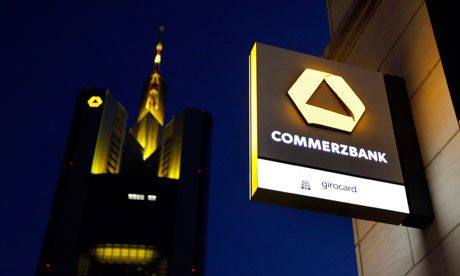Bonuses for 2008 at City subsidiary Dresdner Kleinwort were guaranteed, high court rules, even though parent company lost €6bn that year in the depths of the financial crisis


Commerzbank had attempted to cut the 2008 bonuses paid to bankers at its then newly acquired London subsidiary because of heavy losses made by the group. Photograph: Mario Vedder/AP
More than 100 London investment bankers will share €50m (£40m) in backdated bonuses after the high court ordered Commerzbank to honour a four-year-old "binding" contract.
Despite sustaining heavy losses in the credit crunch, Commerzbank, which acquired the City of London investment bank Dresdner Kleinwort Ltd (DKL) when it took control of Dresdner Bank in 2009, will now have to pay DKL employees sums amounting in some cases to more than €2m each.
The judgment, dating back to a 2008 dispute, comes as shareholder sentiment is turning against excessive wage deals for City executives and is likely to reinforce the popular perception that banks are run for the benefit of senior staff.
By enforcing such narrow contractual obligations, the courts appear to have restricted banks' leeway for withholding payments on the grounds that they failed to make profits. Lawyers also warned that it may encourage a wave of copycat claims from other "disgruntled bankers".
In January, Andrew Hochhauser QC, for the employees, told the court that bonuses should have been paid for the 12 months ending 31 December 2008 – the year of the banking crisis, when Dresdner lost more than €6bn – from a guaranteed minimum bonus pool of €400m because of "binding and enforceable contractual promises" made between August and December 2008.
They were to be allocated to front- and middle-office employees in the usual way, taking into account individual performance.
The bonus pool was created in order to retain staff in the face of a threatened mass exodus. The court heard that employees were reassured by Stefan Jentzsch, then chief executive of Dresdner Kleinwort Investment Bank, that the money would remain "no matter what", irrespective of financial performance.
Announcing that the unpaid bonuses should be honoured, the judge, Mr Justice Owen, said: "The claimants are entitled to payment of bonuses provisionally awarded to them."
He added: "While these claims arose in 2008 against the background of the major crisis in the international banking industry and while the subject of bonuses paid to those employed in the banking sector remains a subject of intense public interest, the issues to which these claims gave rise arose within a narrow ambit and concern the nature and existence of contractual obligations owed to the claimants by their employer. They did not concern wider issues as to the structure of remuneration within the banking industry."
A Commerzbank spokesman said later: "We are disappointed with the court's decision and will seek leave to appeal. The bank believes that the decision to reduce discretionary bonuses in light of €6.5bn of losses at Dresdner Kleinwort for 2008 was responsible and justified.
"The main argument revolves around whether the announcement on 18 August amounted to a legally binding agreement. It is the bank's submission that there is every prospect that the court of appeal would come to a different view on this matter."
Mark Levine and Daniel Naftalin, partners at Mishcon de Reya, who represented 21 of the bankers, commented: "We welcome the high court's decision today confirming the bank's contractual obligation to pay retention awards promised to our clients in exceptional circumstances in 2008.
"Dresdner made repeated promises to employees prior to its sale to Commerzbank in an attempt to avoid a mass exodus of staff – namely that they would be financially rewarded from a guaranteed retention pool for remaining at the bank and performing well.
"We welcome the high court ruling that these promises constituted a binding contract and, with the staff having performed their side of the contract, that the bank breached it by refusing to honour the payments it had promised.
"This case is likely to have significance whenever employment contracts are varied, particularly on the basis of verbal commitments or actions."
Paul Quain, a partner at GQ Employment Law who worked on the dispute, warned that the decision could encourage more financial claims. "This ruling will force banks to be extremely cautious when communicating with staff about their pay and bonuses, even in an informal manner," he said. "If they are not careful, they run the risk of being held to any promises they make, even if that was not their intent.
"We could now see a wave of copycat lawsuits. Disgruntled bankers could bring claims against their employer that a casual promise by their manager about a bonus amounted to a binding contractual agreement.
"Banks will be discouraged from using group methods for communicating with staff, such as 'town hall meetings', which have become increasingly popular. They won't want to risk inadvertently making expensive binding promises to large numbers of staff."

No comments:
Post a Comment